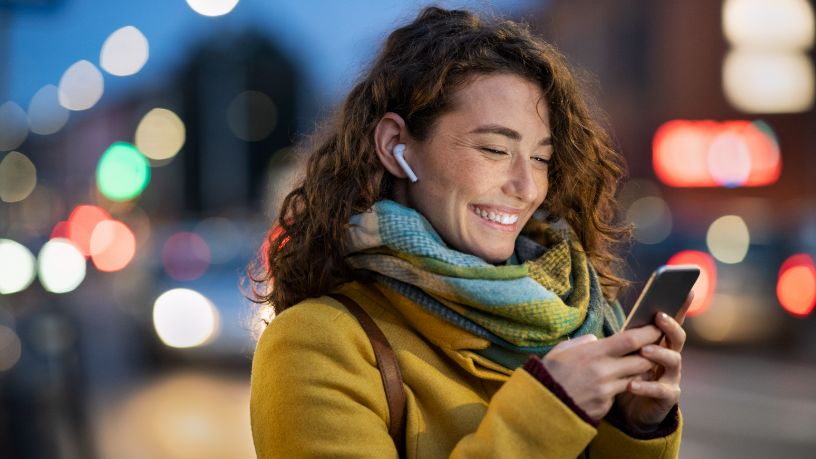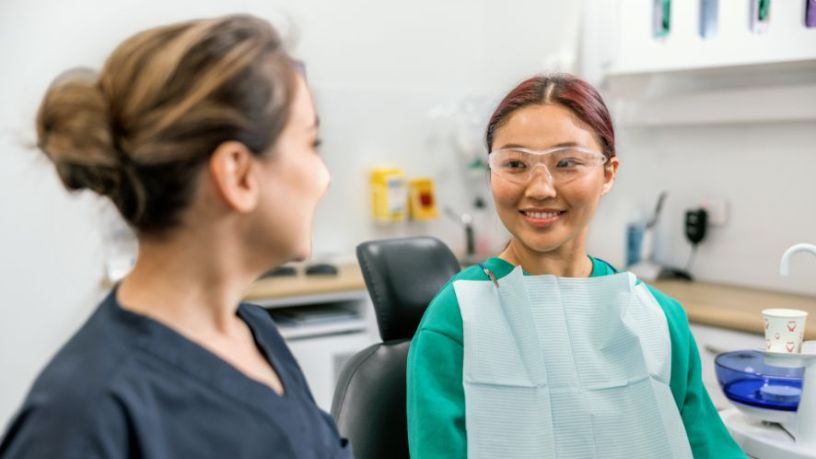Oral health is linked to a range of health issues, so it’s important you look after your teeth and gums properly.
Key takeaways
There are a few dental habits that you might be getting wrong.
Discover 7 expert tips on the everyday things you can do to look after your smile.
A healthy smile is about more than just avoiding tooth aches and bad breath. Good dental health is important for your quality of life.
Poor oral health, on the other hand, is linked to a host of health conditions far beyond the mouth, including stroke, heart disease, diabetes, respiratory illnesses and pregnancy problems.1 It can even take a toll on your emotional and mental wellbeing.2
So, how can you keep your smile in shape?
Dentist Dr Mark Psillakis shares his top 7 tips to kick-start good oral health habits.
1. Reconsider your technique
You probably brush your teeth every morning and night. But have you ever stopped to ask yourself if you’re brushing them correctly?
According to Dr Psillakis, if you’re not using the right brushing technique, you could be doing more harm than good.
“If you’re in the habit of using the wrong technique, not only will it be less effective but [it’s also] potentially damaging to both your teeth and gums,” he says.
So, what is the right technique?
Dr Psillakis recommends:
- holding your toothbrush at a 45 degree angle to the gum line
- using a gentle, circular motion
- cleaning all surfaces of your teeth, including the backs and where your teeth meet your gums
- avoiding side-to-side scrubbing, which can damage teeth and gums
- rinsing when finished.
2. Brush your tongue
Your tongue harbours a lot of bacteria, so it’s not just your teeth that need a good brush.
You may think that mouthwash is up for this job, but the sticky biofilm that coats your tongue needs to be physically removed with a toothbrush.
There’s no need to scrub vigorously. Gently brush the tongue, and don’t forget to rinse when you’re done!
3. Floss like a boss
No amount of brushing can replace flossing your teeth. So, when it comes to dental hygiene, flossing is non-negotiable.
“The fact is, your toothbrush’s bristles don’t get between your teeth,” says Dr Psillakis. “So, you need to floss daily to avoid decay and gum disease later down the track.”
If your flossing technique needs a tune up, Dr Psillakis recommends the following:
- Slide the floss between your teeth with a gentle sawing action, and gently work it up and down, against the surfaces of each tooth.
- For each tooth, push the floss down just under your gum line rather than snapping it down between your teeth, which might traumatise the gum and cause bleeding.
- After flossing, rinse your mouth out with water to remove any leftover food.
- If you have narrow gaps or hard-to-reach areas, talk to your dentist about ‘interdental brushes’ (which help get between teeth) instead of floss.
4. Use the right mouthwash
Dr Psillakis says that it’s important to use mouthwash only for specific purposes and not just to cover bad breath.
“An alcohol-free mouthwash can help control bacterial build-up,” he says. “And if you’re prone to decay, your dentist might recommend a mouthwash with fluoride.”
Watch out for mouthwashes with chlorhexidine gluconate. You should only use this mouthwash for short periods, such as when treating gingivitis, as it can stain your teeth or dentures.3
5. Reduce your sugar intake
Good oral health and sugar generally don’t mix.
“Bacteria in your mouth uses sugars to make acid, which in turn results in decay,” says Dr Psillakis.
Carbonated drinks, even if they're sugar-free, are usually acidic and erode the enamel on your teeth by removing much-needed calcium.
If you’re struggling to give up carbonated drinks, try drinking through a straw to minimise the liquid’s contact with your teeth.
6. Drink water
Water is the best thing to drink for healthy teeth and gums. It’s also a great way to remove excess food after eating (like that speck of spinach on your front tooth).
“Flushing your mouth out with water gets rid of food that’s otherwise stuck on your teeth for long periods (leading to decay) and may prevent stains from things like coffee, tea and alcohol,” says Dr Psillakis.
7. Seek some sun
Did you know that you can improve your oral health with a little good old-fashioned sunshine?
“Your skin needs exposure to the sun to synthesize vitamin D3, which is important for calcium absorption and healthy teeth and gums,” says Dr Psillakis.
In summer, you’re likely to get enough vitamin D from just a few minutes outdoors. But when winter strikes, it’s worth spending some extra time exposing your forearms to the midday sun.4
And remember, while fine tuning your dental habits can make a huge difference to your health, it doesn’t replace regular visits to the dentist. So, if it’s been a while since your last check-up, make an appointment today.

At Bupa, trust is everything
Our health and wellbeing information is regularly reviewed and maintained by a team of healthcare experts, to ensure its relevancy and accuracy. Everyone's health journey is unique and health outcomes vary from person to person.
This content is not a replacement for personalised and specific medical, healthcare, or other professional advice. If you have concerns about your health, see your doctor or other health professional.
1Australian Government, Australian Institute of Health and Welfare. (2023). Oral health and dental care in Australia [Press Release].
2Samaranayake, L. (2022). Oral Health, Happiness, and Well-being. International Dental Journal, 72(2), 149.
3Cleveland Clinic. (2024). Chlorhexidine Oral Rinse. Cleveland Clinic.
4Uwitonze, A. M., Murererehe, J., Ineza, M. C. et al. (2018). Effects of vitamin D status on oral health. The Journal of Steroid Biochemistry and Molecular Biology, 175, 190-194.
You might also like...
The importance of oral hygiene
Bupa dentist Dr Malcolm Duff explains why looking after your teeth and gums should be an important part of your daily routine.
Homemade toothpaste: Does it do more harm than good?
You may have heard about natural toothpaste, but is this supposedly healthier alterative better or even safer than your usual store-bought toothpaste?
How to look after your teeth as you get older
Your oral health can change as you age. Here’s what you can do to look after your teeth and gums.
Visiting a dentist in Australia
Regular dental check-ups are an important part of maintaining a healthy smile. Discover 6 things you should know about visiting a dentist in Australia.





